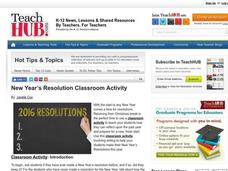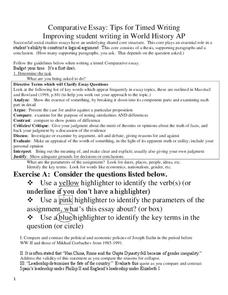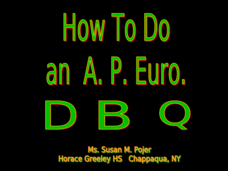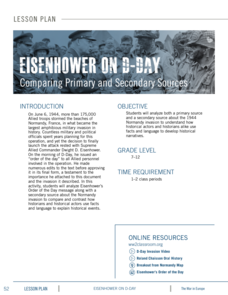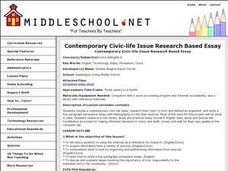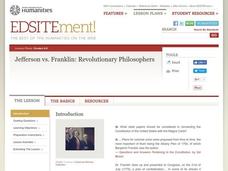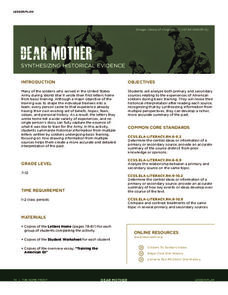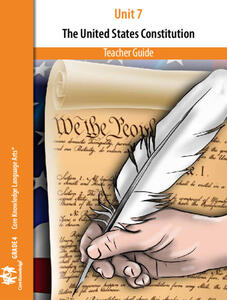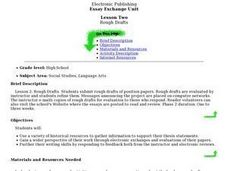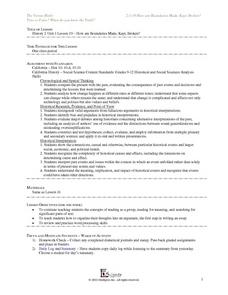Teach Hub
New Year’s Resolution Classroom Activity
Create a sense of accountability among scholars with a instructional activity that focuses on making and keeping New Year's resolutions. Writers compose a five paragraph essay focused on three resolutions—promises to...
Curated OER
Let Me Tell You About My State
State reports can be a lot of fun, especially when the learners get to choose the state they study. This research and writing-focused social studies lesson engages learners in collecting information, essay structure, research, and...
Wyatt Bingham
Comparative Essay: Tips for Timed Writing
This site provides a guideline for writing a comparative essay for the AP World History Test. It also provides practice exercises and samples.
Curated OER
How To Do an AP Euro DBQ
Are your AP classes struggling with Document Based Questions? Nip their problems in the bud with this clear and comprehensive presentation, which compares a "dazzling DBQ" to a hamburger, outlining all of the layers therein....
Curated OER
There's No Accountin with Ledgers
Tenth graders create and maintain a ledger, write an essay for the process, and learn to keep financial accounts through the ledger. In this ledger lesson, 10th graders define an accounting ledger and create one for the money they've...
Constitutional Rights Foundation
Women in the Military
Scholars analyze the role of women in the military in United States history. Using group research, debate, and diary entries, they explore various military activity in America. To complete the lesson, young historians write an essay...
Curated OER
Comparative Essay – Scholarly Articles
In this comparative essay worksheet, students read and complete the narrative for the assignment that requires them to prepare predrafts of their comparative-scholarly articles.
Curated OER
Essay Exchange Unit: Response to Essays
Students receive and read electronic reviews of their essays.
Museum of Tolerance
Just What Kind of American Are You?
Your parents were both in different countries. You were born in the US. Documents and application forms ask you to identify your racial or ethnic classification. Which box do you check? Class members collect documents...
New York City Department of Education
Grade 11 Literacy in Social Studies: Research Paper
The lesson guides young academics through the steps in producing a 10-page research paper on any topic in American history. Historians begin by formulating a thesis and gathering resources, then move on to creating an outline, and end...
National WWII Museum
Eisenhower on D-Day: Comparing Primary and Secondary Sources
Dwight D. Eisenhower's message to troops for D-Day is iconic. Individuals examine Eisenhower's words and compare that to historians' understanding of the epic events of that day using primary sources, an essay, and a Venn diagram to...
Curated OER
Contemporary Civic-life Issue Research Based Essay
Seventh graders write a five paragraph persuasive essay on a contemporary civic-life issue.
Curated OER
Black Power
Use this New York Times instructional activity to research contemporary leaders in the African-American community. After reading the article "Blacks Weigh the Impact of the Post-Jackson Years," middle and high schoolers discuss the...
Curated OER
Jefferson vs. Franklin: Revolutionary Philosophers
Students cite connections among Franklin's Albany Plan of 1754, his Plan of Confederation of 1775 and the U.S. Constitution and/or the Declaration of Independence. In an essay, they give examples of the philosophical and political...
National WWII Museum
Dear Mother: Synthesizing Historical Evidence
It's one thing to read history, it's another to live it. Pupils examine secondary and primary sources that detail the training of soldiers before deployment. Then, they consider the impact of primary sources on how they understand the...
Curated OER
Making the Personal Political
Students identify controversial topics on which they have strong opinions and model their own persuasive opinion pieces after the featured article. They compose persuasive essays on controversial issues that "hit home" for them.
Core Knowledge Foundation
Unit 7: The United States Constitution
Fourth graders delve into the United States Constitution in a unit designed to boost reading comprehension, grammar, and writing. During each lesson, scholars read through and discuss a new chapter and work with prefixes and verbs....
Curated OER
"I Believe..." Podcast Style
Use this communication skills lesson to emphasize evaluating a speaker's main point and argument. After reading Martin Luther King's, "I Have a Dream Speech" and John F. Kennedy's speech, "I Believe in an America Where the Separation of...
Polk County Public Schools
Suffragists
The Women's Rights movement is the focus of an engaging and collaborative exercise, in which young historians use information found in textbooks, class notes, and the provided documents to craft a DBQ essay.
Curated OER
Shaking the Movers: Youth Rights and Media
Children have rights! Exploring those rights and using media to express those rights is the focus of this Media Awareness Network lesson. Although some of the law links reflect the Canadian Articles of The Convention, the majority of the...
Our White House
The Our White House Inauguration Celebration Kit for Kids!
Get the youngest American citizens involved in the presidential election and inauguration with a set of social studies activities. Focusing on the history of presidential inauguration ceremonies, learners draft their own poems, design...
Curated OER
Empathy and the Vietnam War
Students explore the implications of the draft during the Vietnam War. In this Vietnam lesson, students analyze the lyrics of songs that explore differents opinions of the Vietnam draft. Students particpate in a role-play activity...
Curated OER
Essay Exchange Unit: Rough Drafts
Students submit rough drafts of position papers and post them on computer networks for review.
Curated OER
How Are Boundaries Made, Kept, Broken?
Students write a first draft of an essay reflecting their opinions of Things Fall Apart. They complete their circle diagrams, have them approved by the teacher, and write their essays. They write in their dialectical journals as they...
